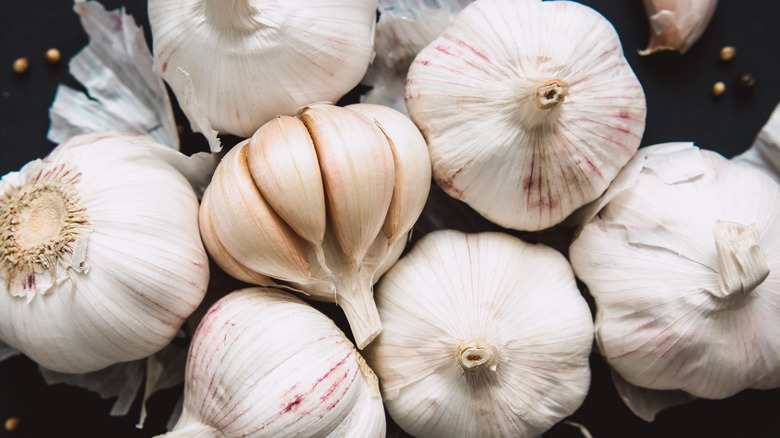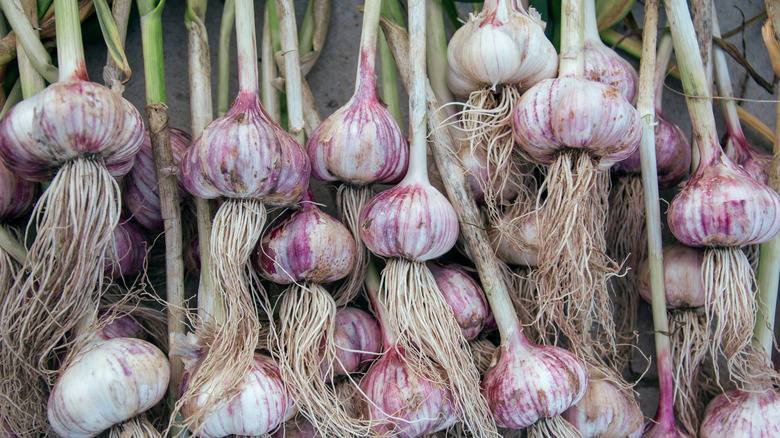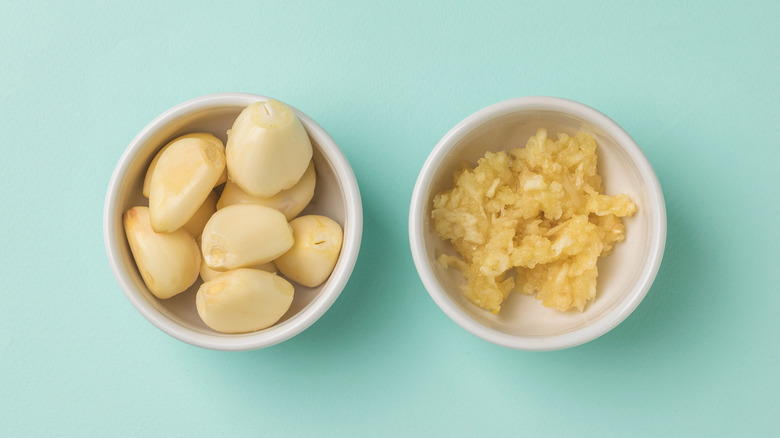Why It's A Bad Idea To Refrigerate Garlic
Garlic might repel vampires, but for many Allium sativum fans, it's magnetic.
If you sprinkle your movie night popcorn with garlic powder or pull a steaming tray of garlic bread from the oven with every spaghetti dinner, you already know what a difference garlic can make in the kitchen. Beginner and long-time chefs alike start out honing their culinary skills by cooking with garlic.
In the Journal of Nutrition, Dr. Richard S. Rivlin, MD, reports that physician and "Father of Medicine," Hippocrates, was prescribing garlic to ailed Greeks as early as 480 BCE. The health benefits of garlic are (almost) as delicious as its flavor profile. Medical News Today reports that garlic can aid in remedying respiratory problems, parasites, poor digestion, and fatigue.
Whether you're in it for the science or the taste, be sure not to make the common mistake so many home cooks do– storing garlic in the fridge. Here's why you should keep garlic out of the refrigerator.
Refrigeration causes sprouting
According to Dr. Leonard Perry, Department of Plant and Soil Science at the University of Vermont, there are 11 types of garlic. Garlic (Allium sativum) is divided into two main categories: the hardneck (ophioscorodon) and softneck (sativum). These are based on whether the garlic variation sprouts a long bulbis neck from the top of the plant. (Check out this fermented subspecies, black garlic.)
However, despite its variety of different subspecies, proper storage methods are universal for all types of garlic. The most important factor impacting garlic's freshness is temperature.
Coldness causes garlic to begin sprouting. Sprouting is the process in which garlic develops offshoot growths, via KCET PBS –- like when tuber vegetables such as sweet potatoes grow thin curly roots as they begin deteriorating.
Storing garlic cloves at room temperature is the best way to prevent premature sprouting and optimize freshness. Biologist Sarit Rohkin Shalom of the National Library of Medicine conducted a study and found that garlic plants from cold storage developed sprouts twice as quickly as cloves stored at room temperature. Early bulb formation induced by cold storage, he reports, impedes normal foliage leaf development. According to Bon Appétit, sprouted garlic is technically safe to eat, but its sharp, bitter flavor is considered less than ideal by most palettes.
How to properly store garlic at room temperature
Keeping the entire garlic bulb whole is the best way to store fresh garlic. Once the bulb is broken, says Heathline, greater surface area is exposed to oxidation and the garlic's life span decreases. The garlic experts at Spice Cravings maintain that whole bulbs of garlic will keep for as long as 3-6 months at room temperature while whole, unpeeled cloves will only keep for up to 10 days.
If the temperature is the most important factor in keeping garlic fresh, ventilation is the second most important. Gilroy Garlic substantiates that garlic needs thorough ventilation to prevent rot and molding. They suggest investing in a garlic keeper, like this one from West Elm. Alternatively, the easiest, most cost-friendly method for aerating your cloves is by keeping them in a mesh grocery bag, like this one from Public Goods.
Take a cue from Hippocrates and load up on the garlic. With these tips, you'll be sure to reap all the flavor and health benefits of garlic and keep it fresh.


